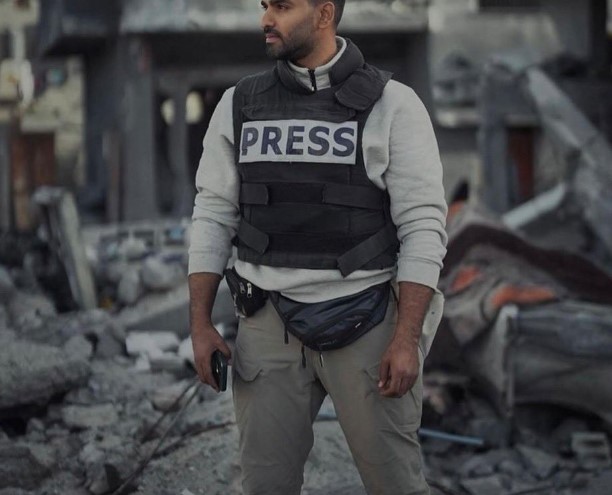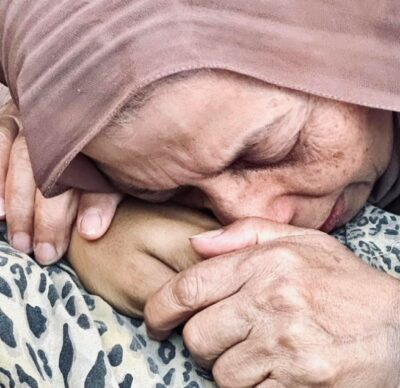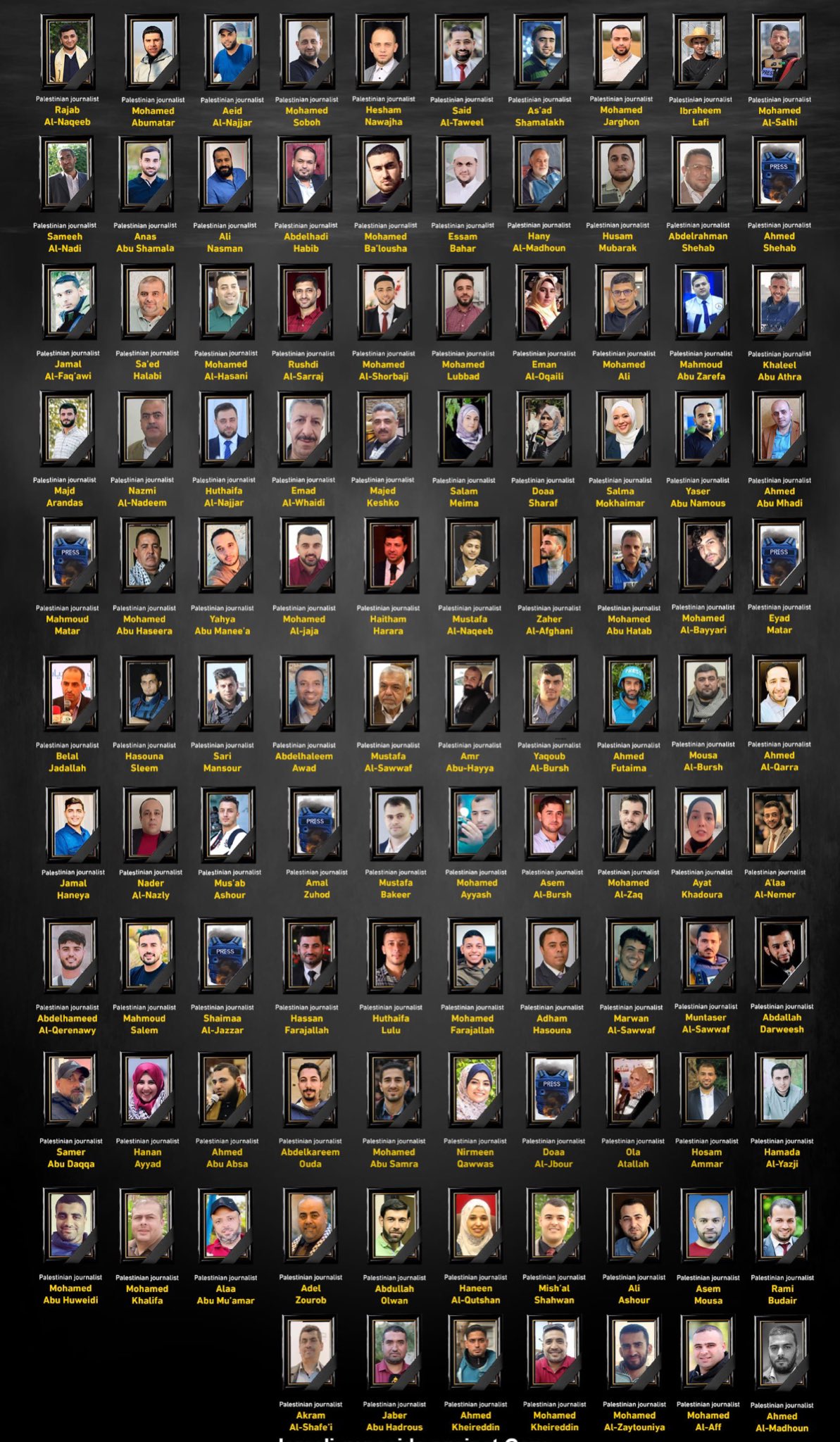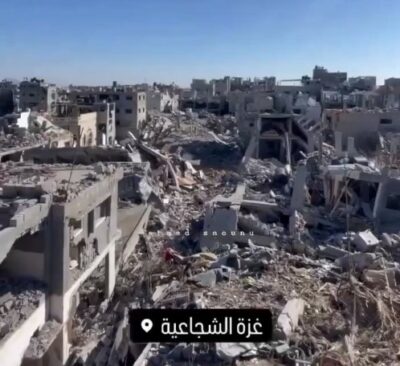On Wednesday, throughout the day and the night, the Israeli army continued to bomb various parts of the destroyed and devastated Gaza Strip, killing dozens of additional Palestinians and wounding many more.
In Rafah, in the southern Gaza Strip, the Israeli army fired a missile at a tent housing displaced civilians from central and northern Gaza, causing many casualties.
|This Article Is An Update For: Day 96: Israeli Missiles And Shells Kill Dozens, Injure Hundreds, In Gaza|
The Qatar-based Al-Jazeera said an Israeli strike in Rafah has killed at least five Palestinians, as the Israeli army intensified the ground invasions and bombings in the central and southern Gaza Strip, killing 147 a day earlier.
Al-Jazeera added that the army also bombed areas near the Al-Aqsa Hospital in Deir Al-Balah, in central Gaza, killing at least eight Palestinians and wounding many others; the Health Ministry said the attack killed and injured 40 Palestinians.
One of the slain Palestinians is a journalist, Ahmad Badir, who was killed, and many were injured, some seriously, when the army bombed the entrance of Al-Aqsa Hospital.
In addition, the army fired missiles and shells at various areas in the Nusseirat refugee camp in central Gaza, causing many casualties.
In Al-Maghazi refugee camp in central Gaza, the Israeli army killed many Palestinians, including four medics of the Palestinian Red Crescent Society (PRCS) and two wounded Palestinians in their ambulance, and wounding scores when it fired missiles at a home and an ambulance.
The PRCS said its slain medics are Yousef Abu Muammar, Fadi Fuad Al-Ma’ni, Islam Abu Ryala, and Fuad Abu Khammash.
In Khan Younis, in the southern Gaza Strip, Israeli missiles struck a home from the Abu Namous family in the western part of the city, killing at least seven Palestinians and injuring 25, including women and children.
Many Palestinians were also killed and injured in separate Israeli attacks in several parts of Khan Younis.
The army also fired flares around the Nasser Hospital in Khan Younis and a UNRWA make-shift shelter in the center of the city,
 In Rafah, in the southern Gaza Strip, the army fired missiles and shells at a land where families who fled their homes created a makeshift shelter northwest of the city, killing four children, including a newborn, and wounding many Palestinian.
In Rafah, in the southern Gaza Strip, the army fired missiles and shells at a land where families who fled their homes created a makeshift shelter northwest of the city, killing four children, including a newborn, and wounding many Palestinian.
Rami Abdu, Assist. Professor of Law & Finance and Chairman of Euro-Med Human Rights Monitor said:
“Palestinians from the Al-Astal family, recently discovered as victims of Israeli genocide on January 9, 2024, amounted to approximately 60 individuals (8 families, including children and grandchildren, were removed from the civil registry).
- Naif Mustafa Al-Astal and his wife Asmaa Al-Astal.
- Adel Al-Astal, his wife Firdous Al-Astal, and their sons Muhammad, Rafiq, Anis, and Bilal, along with their wives and grandchildren.
- Marwan Muhammad Al-Astal, his wife Zeinat Mustafa Al-Astal, and their sons Muhammad Marwan Al-Astal, Mustafa Marwan Al-Astal, and their daughters Malak, Doha, and Fadwa.
- Maher Muhammad Al-Astal and his wife Etaf Ali Al-Saqa, along with their sons Haitham, Muhammad, Abdul-Azim, and their daughters Saja, Sama, and Suhah.
- Anis Muhammad Al-Astal, his wife, and their sons Fares, Jamal, Khalil, and Sanad, along with their daughters Ghadeer, Ghufran, and Ghalya, and their child.
- Muhammad Rashad Al-Astal, his wife Nadiya Walid Al-Astal, along with their daughters Walaa, Nada, and Leen, and their sons Walid and Rashad.
- Midhat Rashad Al-Astal, his wife Fadwa Marwan Al-Astal, along with their sons Rashad, Marwan, Muhammad, and their daughter Dana.
- Rowaida Muhammad Al-Astal (Al-Abadlah), her husband Ashraf Al-Abadlah, and their daughter Heba Al-Abadlah and Joudi Awad.
All of them, along with their children, daughters, and grandchildren, were killed.”
On its part, the United Nations Office for the Coordination of Humanitarian Affairs (OCHA) said only three of the 21 planned aid deliveries to the northern part of the Gaza Strip, were allowed into Gaza since the beginning of this month.
مشاهد مؤلمة وقاسية من اللحظات الأولى بعد القصف “الإسرائيلي” الذي استهدف منزلاً في محيط مستشفى شـهداء الأقصى بدير البلح وسط قطاع #غزة وأسفر عن ارتقاء الزميل الصحفي #أحمد_بدير واثني عشر فلسطينياً آخرين#غزة_تحت_القصف #GazaGenocide #Gaza pic.twitter.com/OcZhoQ0tql
— بوابة اللاجئين الفلسطينيين (@refugeesps) January 10, 2024
OCHA said (Full Report): “Between 1 and 10 January, only 14 percent (3 of 21) planned aid deliveries of food, medicines, water, and other lifesaving supplies to the north of Wadi Gaza proceeded. Humanitarian partners were forced to cancel or delay missions in two instances due to excessive delays at Israeli checkpoints or because the agreed routes were unpassable. Humanitarian partners’ ability to respond to extensive needs in the northern side of Gaza is being curtailed by recurring denials of access for aid deliveries and a lack of coordinated, safe access by the Israeli authorities. These denials and severe access constraints paralyze the ability of humanitarian partners to respond meaningfully, consistently, and at-scale.”
“Between 1 and 10 January, only 14 percent (3 of 21) planned aid deliveries of food, medicines, water, and other lifesaving supplies to the north of Wadi Gaza proceeded. Humanitarian partners were forced to cancel or delay missions in two instances due to excessive delays at Israeli checkpoints or because the agreed routes were unpassable. Humanitarian partners’ ability to respond to extensive needs in the northern side of Gaza is being curtailed by recurring denials of access for aid deliveries and lack of coordinated, safe access by the Israeli authorities. These denials and severe access constraints paralyze the ability of humanitarian partners to respond meaningfully, consistently, and at-scale.”
 “In Deir al Balah and Khan Younis, three hospitals – Al Aqsa, Nasser, and Gaza European – are at risk of closure due to the issuance of evacuation orders in adjacent areas and the ongoing conduct of hostilities nearby.”
“In Deir al Balah and Khan Younis, three hospitals – Al Aqsa, Nasser, and Gaza European – are at risk of closure due to the issuance of evacuation orders in adjacent areas and the ongoing conduct of hostilities nearby.”
On January 9, shelling was again reported in the vicinity of the Al Aqsa Hospital in Deir al Balah, from where most medical staff and many patients had evacuated on January 7. Reportedly, only one emergency doctor and two surgeons remain to respond to hundreds of patients who require treatment in the hospital. On January 7, staff from WHO and OCHA visited the Al Aqsa Hospital and delivered medical supplies to support 4,500 patients needing dialysis for three months and 500 patients requiring trauma care.”
Israel revised its death toll to 1.139 and said seventeen officers and soldiers were injured in the last 24 hours, and on Tuesday nine soldiers were killed and 27 were injured; the declared number of Israeli soldiers killed by Palestinian fighters since October 7 is now 520, including 192 since the beginning of the ground offensive on October 27.
Reports from earlier in the day, Wednesday, revealed that the Israeli army has killed 23,357 Palestinians, including 9600, and injured more than 59,410 since October 7.
The declared number of slain Palestinians does not include an estimated 8,000 more still buried under rubble (4,900 women and children). Euro-Med Monitor reports 30,676 Palestinian deaths, since October 7.
The names of the Palestinian journalists killed by Israeli soldiers in Gaza, whether by bombing or sniper fire. @RamAbdu, @EuroMedHR
1. Mohammad Al-Salehi
2. Ibrahim Lafi
3. Mohammad Jarghoun
4. Asaad Shamlakh
5. Saeed Al-Taweel
6. Hisham Al-Nawajha
7. Mohammad Abu Rizq
8. Ayed Al-Najjar 9.
Mohammad Abu Matar
10. Rajab Al-Naqeeb
11. Ahmad Shahab
12. Abdul-Rahman Shahab
13. Hossam Mubarak 1
4. Hani Al-Madhoun
15. Essam Bahar
16. Mohammad Balousha
17. Abdul-Hadi Habib
18. Ali Nasman
19. Anas Abu Shammala
20. Sameeh Al-Nadi
21. Khalil Abu Aadra
22. Mahmoud Abu Dhriefa
23. Mohammad Ali
24. Iman Al-Aqili
25. Mohammad Labad
26. Mohammad Al-Shourbaji
27. Rashdi Al-Sarraj
28. Mohammad Al-Hasani
29. Saed Halabi
30. Jamal Al-Faqawi
31. Ahmad Abu Mahadi
32. Yasser Abu Namus
33. Salma Mukhaimar
34. Du’aa Sharaf
35. Salam Maimeh 36.
Majed Kashko
37. Emad Al-Wahidi
38. Hotheifa Al-Najjar
39. Nazmi Al-Nadeem
40. Majd Arandas
41. Iyad Matar
42. Mohammad Al-Biyari
43. Mohammad Abu Hatib
44. Zahir Al-Afghani
45. Mustafa Al-Naqeeb
46. Haitham Harara
47. Mohammad Al-Ghajja
48. Yahya Abu Munia
49. Mohammad Abu Husseira
50. Mahmoud Matar
51. Ahmad Al-Qara
52. Mousa Al-Barsh
53. Ahmad Fatima
54. Yacoub Al-Barsh
55. Amro Abu Hayya
56. Mustafa Al-Sawaf
57. Abdel Halim Awad
58. Sari Mansour
59. Hassouna Islime
60. Bilal Jadallah
61. Alaa Al-Nimer
62. Ayat Khadhura
63. Mohammad Al-Ziq
64. Asim Al-Barsh
65. Mohammad Ayash
66. Mustafa Bakir
67. Amal Zahed
68. Musab Ashour
69. Nader Al-Nazli
70. Jamal Haniya
71. Abdullah Darwish
72. Montaser Al-Sawaf
73. Marwan Al-Sawaf
74. Adham Hassouna
75. Mohammad Farajallah
76. Hudhaifa Lulu
77. Hassan Farajallah
78. Shaimaa Al-Jazar
79. Mahmoud Salem
80. Abdel Hamid Al-Qurainawi
81. Hamada Al-Yazji
82. Hossam Ammar
83. Ola Ata Allah
84. Du’aa Al-Jabour
85. Nermin Qawas
86. Mohammad Abu Samra
87. Abdeul-Karim Odah
88. Ahmad Abu Abseh
89. Hanan Ayyad
90. Samer Abu Daqa
91. Rami Bdeir
92. Assem Kamal Mousa
93. Ali Ashour
94. Mashal Shahwan
95. Haneen Al-Qatshan
96. Abdullah Alwan
97. Adel Zarab
98. Alaa Abu Mummar
99. Mohammad Khalifa
100. Mohammad Abu Howaidi
101. Ahmad Jamal Al-Madhoun
102. Mohammad Abdel Khaleq Al-Af
103. Mohammad Younis Al-Zaitounia
104. Mohammad Khair Al-Din
105. Ahmad Khair Al-Din
106. Jaber Abu Hadrous
107. Akram Al-Shafei
108. Hamza Wael Al-Dahdouh
109. Mustafa Thurayya
110. Ali Salem Abu Ajwa
111. Abdullah Iyad Breis
112. Ahmad Bdeir
113. Heba Al-Abadla
114. Sherif Okasha
115. Fouad Abu Khamash


